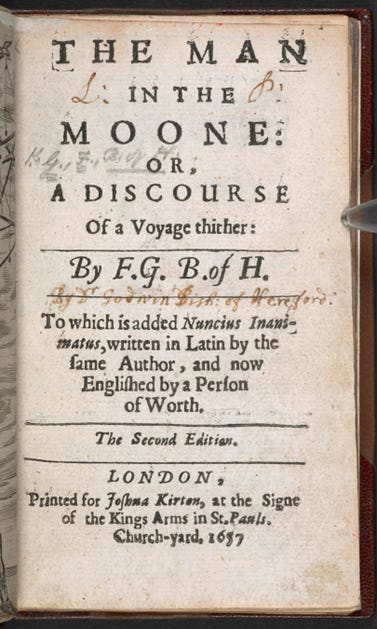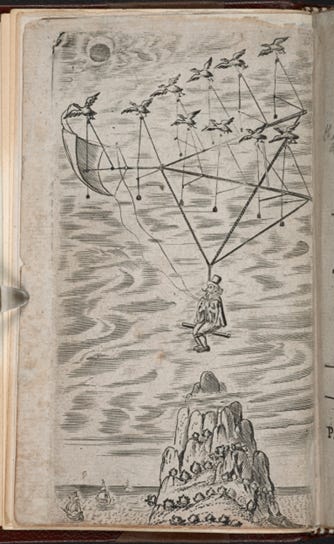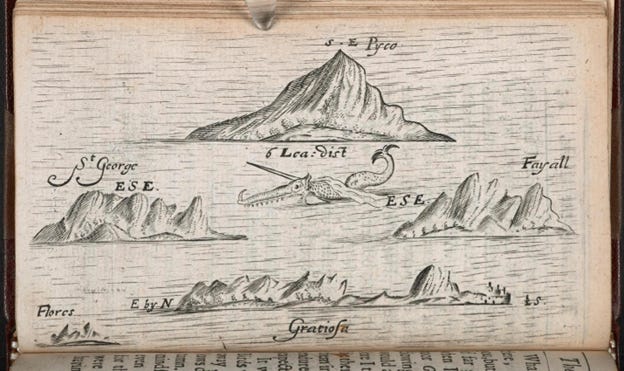“You Shall Have Such Things As Philosophers Could Never Dream Of…”
What drives the visions of people in our community?
One of the things I like about substack writers and commentators is the tendency of individuals to have an optimistic vision of what the future will hold. They are eager to tell you about it. Even when they sound sour, they are only revealing that their vision isn’t happening fast enough, or that the world has missed their advice.
There are Medium articles about how the future will look in every field, with space exploration, climate change, wellness, top trends, and AI.
These visions come from an assumed joint understanding that discussion of the next steps will be science-based. Conjectural conspiracy theories are left at other doorsteps….’turn Right for space lasers’. Science Fiction, based on projections, is an honoured guest at this Medium table.
Science fiction comes from all of humanity; an appraisal in The Atlantic makes it plain that many different cultures came together to make Science Fiction possible.
The first thing Science Fiction needs is an ability to imagine other worlds. We forget today that this was not a common heritage of humanity; most of our history we believed in what was in front of us, or was taught us by our mothers.
The many-worlds theory that was needed to create science-based alternative fantasies arose in the Muslim world, in writers like Imam Muhammad al-Baqir (676–733). He wrote “I swear by God that God created thousands and thousands of worlds and thousands and thousands of humankind.”
Fakhr ad-Din ar-Razi (1149–1209) rejected the old Greek notion that the Earth is the center of the universe. He argued that there are “a thousand thousand worlds beyond this world such that each one of those worlds be bigger and more massive than this world as well as having the like of what this world has.”
The invention of the telescope appeared to prove that a multitude of life was reasonable. It was the telescope that launched the scientific revolution in Europe; an approximate date would be 1543, with the book by Nicholas Copernicus “On the Revolutions of the Heavenly Spheres”.
It was not received well.
Martin Luther did not mince words : “This fool wishes to reverse the entire science of astronomy; but sacred Scripture tells us [Joshua 10:13] that Joshua commanded the sun to stand still, and not the earth.”
The book’s initial print run of 400 did not sell out. It was written in a turgid technical style. Nevertheless, it was attacked by the Church and buried away. It was never formally banned, but requests were made for “corrections” that never happened.
It was an all-time worst seller.
But every astronomer had a copy.
A hundred years later, by the time Francis Godwin wrote his novel, people were prepared to imagine a different reality.
Some experts consider Godwin’s The Man in the Moone, written in 1638, to be the first work of science fiction.
The story is written as a first-person narrative from the perspective of Domingo Gonsales, the book’s fictional author. The book is styled “an essay of Fancy, where Invention is shewed with Judgment”.
Godwin stirred his readers with a tale of a Spaniard who escapes from an island by traveling in a ship powered by geese (gangas).
They take him through space — which for the first time is depicted as weightless — to a civilization on the moon run by Lunars. The Lunars are very tall and speak a language consisting of tunes and strange sounds. He then leaves for an almost equally exotic destination called China.
Science fiction helped inspire the scientific revolution. For Godwin, the humanities and sciences weren’t just overlapping, they were mutually reinforcing.
Here is the world that Godwin saw among the Lunars:
“You shal then see men to flie from place to place in the ayre; you shall be able, (without moving or travailing of any creature,) to send messages in an instant many Miles off, and receive answer againe immediately you shall bee able to declare your minde presently unto your friend, being in some private and remote place of a populous Citie, with a number of such like things… you shall have notices of a new World… that all the Philosophers of former ages could never so much as dreame of.”
We shall have flight, communications, devices for private use… an oracle based on empiricism and reason.
I find that stunning.
Imagine the era he lived in then. In 1638 the colonists in Massachusetts were telling the English Parliament that they would not accept a governor from their home country…America was stirring.
Louis The Sun King was born in France — the symbol of absolute Royalism.
Pottage was the common food — a mixture of whatever was handy, warmed in a fire pit.
Your health depended on leeches and potions.
You looked forward to career choices like farmer, laborer, carpenter, thatcher, smith and cobbler.
You might live to be in your 50’s but one in four children died before they were five and as many as half had died before 16.
Now this guy Godwin comes along and tells you that you will be able to fly, that your thoughts will be shared with others regardless of their locations, and you will have other wonders that your thinkers have never even dreamt of.
But from the seed of that amazing book, other writers took flight, adding their visions and wonders. From them, the plant of imagination would grow and grow.
People began to wonder about a future Much better than the one they were in.
So the revolutions started…
They started in the most literate region on Earth: America.
And the Americans found that they were right. You can have a better future, if you control it yourself.
Base it on facts, not the fantasies of kings.
I find it an astonishing circle of satisfaction, to realize that the first point of wonder for science fiction — the book called “The Man In The Moone” — was actually achieved by the citizens of a democracy that was based on the idea that all things are possible.
Written in the poetry of delight and wonder, Godwin’s fantasies were confirmed in the prose of experiment and logic.
As I look up into the morning sky right now, I can see the moon clearly. But in a way it’s not the same moon my father saw. For there are footprints on the moon out my window. And nothing will ever be the same.
Science and put together the thundering engines that raised us off the Earth, and imagination assembled the resources to make it happen.
Why did Godwin’s hero return from the delights of the Lunars to go back to Earth?
He missed his wife and his child.
There are things beyond the pull of the stars.
And they are right inside us.
Written by Barry Gander
A Canadian from Connecticut: 2 strikes against me! I'm a top writer, looking for the Meaning under the headlines. Follow me on Mastodon @Barry






